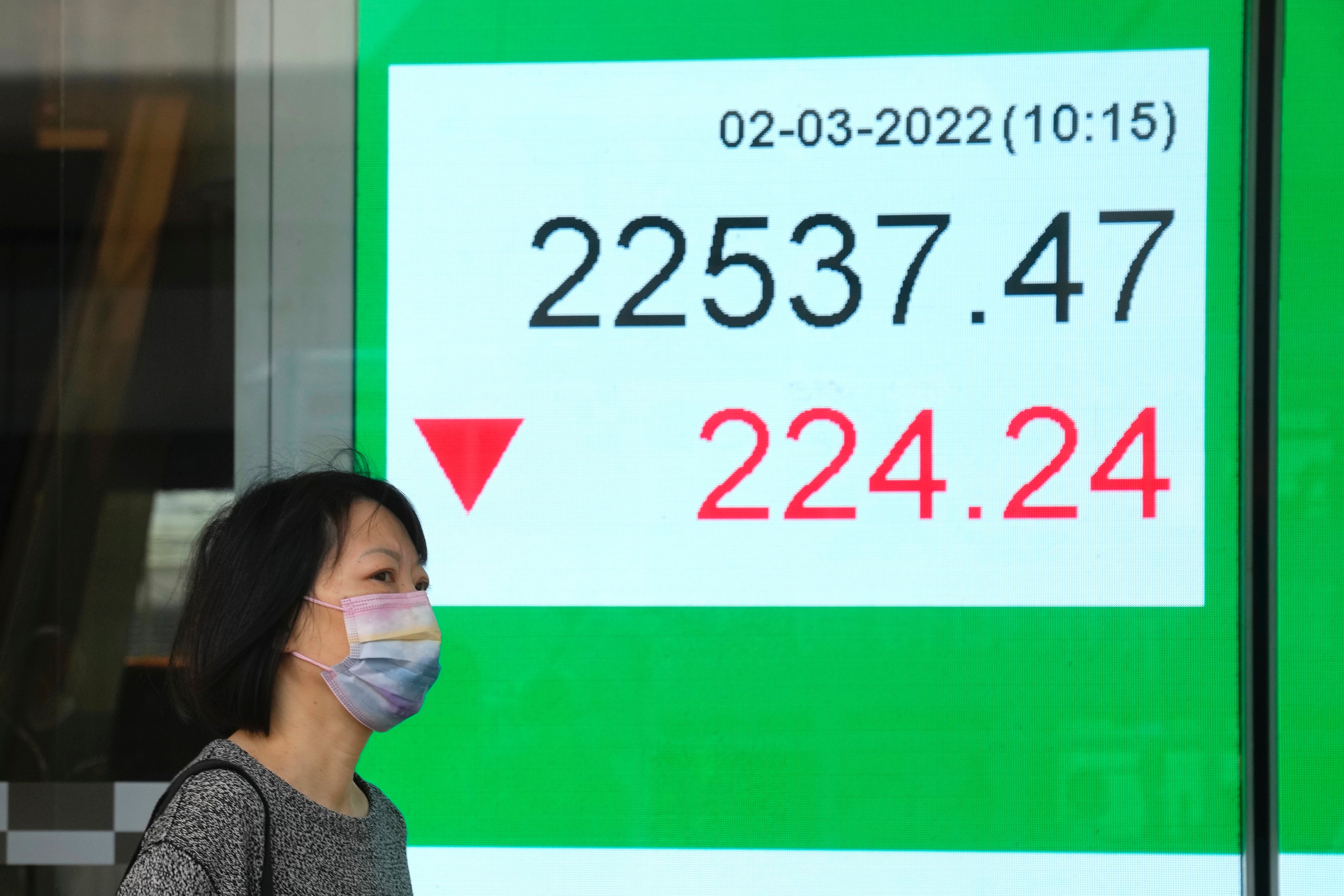Stocks fall, oil tops $100 a barrel as Ukraine war rages
Asian stock markets have slid and oil prices surged more than $5 per barrel as Russian forces stepped up attacks on Ukrainian cities

Your support helps us to tell the story
From reproductive rights to climate change to Big Tech, The Independent is on the ground when the story is developing. Whether it's investigating the financials of Elon Musk's pro-Trump PAC or producing our latest documentary, 'The A Word', which shines a light on the American women fighting for reproductive rights, we know how important it is to parse out the facts from the messaging.
At such a critical moment in US history, we need reporters on the ground. Your donation allows us to keep sending journalists to speak to both sides of the story.
The Independent is trusted by Americans across the entire political spectrum. And unlike many other quality news outlets, we choose not to lock Americans out of our reporting and analysis with paywalls. We believe quality journalism should be available to everyone, paid for by those who can afford it.
Your support makes all the difference.Asian stock markets slid Wednesday and oil prices surged more than $5 per barrel as Russian forces stepped up attacks on Ukrainian cities.
Shanghai, Tokyo, Hong Kong and Southeast Asian markets declined as President Vladimir Putin's invasion fed fears of global economic turmoil. Seoul gained and Sydney was little-changed.
Wall Street's benchmark S&P index lost 1.5% on Tuesday, deepening a two-month-old skid.
The war is adding to worries about global economic growth in the face of plans by the Federal Reserve and other central banks to fight surging inflation by raising interest rates.
"The conspiracy of geopolitical uncertainty and stagflation-type impulses is a brutal shock," Tan Boon Heng of Mizuho Bank said in a report.
Investors await more clues about possible rate hikes when Fed Chair Jerome Powell speaks Wednesday before Congress.
Oil prices rose despite an agreement by the United States and other major governments in the International Energy Agency to release 60 million barrels from strategic reserves to stabilize supply.
Benchmark U.S. crude jumped another $5.01 to $108.42 per barrel in electronic trading on the New York Mercantile Exchange. It rose $7.69 on Tuesday to $103.41.
Brent crude, the price basis for international oils, gained $5.05 to $110.02 per barrel in London. It soared $7 the previous session to $104.97.
“Markets dismissed the notion that 60 million barrels of strategic reserves released will be consequential to the risks of Russian supply jeopardized,” said Tan of Mizuho. “Russia pumps more than that in just six days.”
Late Tuesday, President Joe Biden announced he was joining U.S. allies in closing the country's air space to Russian aircraft.
In an annual State of the Union speech, Biden said he would try to cushion the impact of higher oil prices on Americans. “I will use every tool at our disposal to protect American businesses and consumers,” Biden said.
The Nikkei 225 in Tokyo lost 1.7% to 26,386.69 and the Shanghai Composite Index shed 0.4% to 3,474.45. The Hang Seng in Hong Kong sank 1.1% to 22,518.18.
In Seoul, the Kospi gained 0.5% to 2,712.97.
Sydney's S&P-ASX 200 added 0.1% to 7,106.40 after government data showed Australia's economy grew by 3.4% in the final three months of 2021 over the previous quarter and consumer spending was strong.
India's Sensex opened 1.6% lower at 55,330.77. New Zealand and Southeast Asian markets declined.
Moscow's attack on Ukraine and Russian threats of retaliation in response to Western sanctions also have roiled global markets for wheat and other commodities.
Economists say Asian economies are less exposed to the war than Europe but those that need imported oil will be hit by rising global prices, adding to inflation pressure and depressing business and consumer activity.
Russia is the No. 2 global crude exporter, behind Saudi Arabia. Any potential disruption in supply could boost prices and add to persistent inflation pressures around the world.
Prices of wheat, of which both Russia and Ukraine are important exporters, have risen more than 20% over one month ago.
Investors shifted money into the safe haven of government bonds, pushing up their market price and narrowing the yield, or the difference between the current price and the payout at maturity.
The yield on the 10-year Treasury fell by an unusually wide margin, to 1.73% from Monday's 1.83%.
The value of Russia's ruble fell further to 0.9 U.S. cents despite its central bank's decision Monday to raise interest rates to defend the currency.
On Wall Street, the S&P 500 declined to 4,306.26. The Dow Jones Industrial Average lost 1.8% to 33,294.95. The Nasdaq composite slid 1.6% to 13,532.46.
JPMorgan Chase fell 3.8% and Bank of America slid 3.9%.
More than 70% of the stocks in the S&P 500 closed lower. Technology, industrials and communication companies were among the biggest drags on the benchmark index.
Energy stocks rose. Occidental Petroleum jumped 7%.
Companies were cutting ties with Russia. Apple said Tuesday it has stopped selling its iPhone and other popular products there. BP and Shell are pulling out of investments in the Russian oil industry.
Airplane manufacturer Boeing said it suspended major operations in Moscow and temporarily closed its office in Kyiv. In a statement it said it also suspended supplying parts, maintenance and technical support services to Russian airlines.
The dollar gained to 115.05 yen from Tuesday's 114.86 yen. The euro declined to $1.1115 from $1.1123.